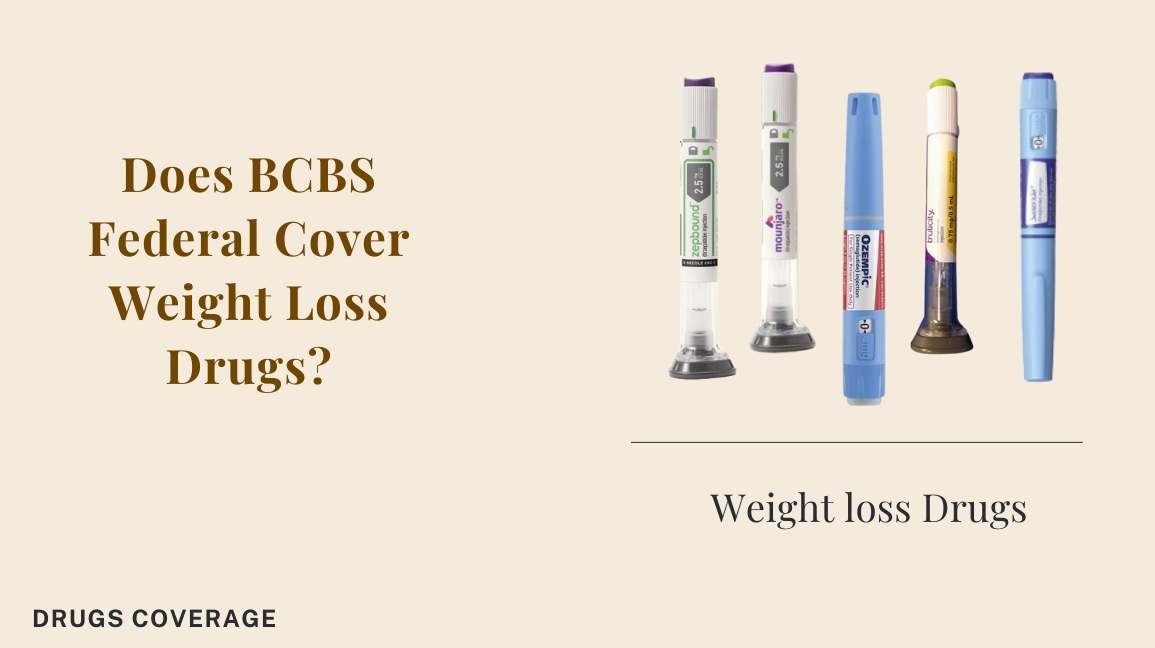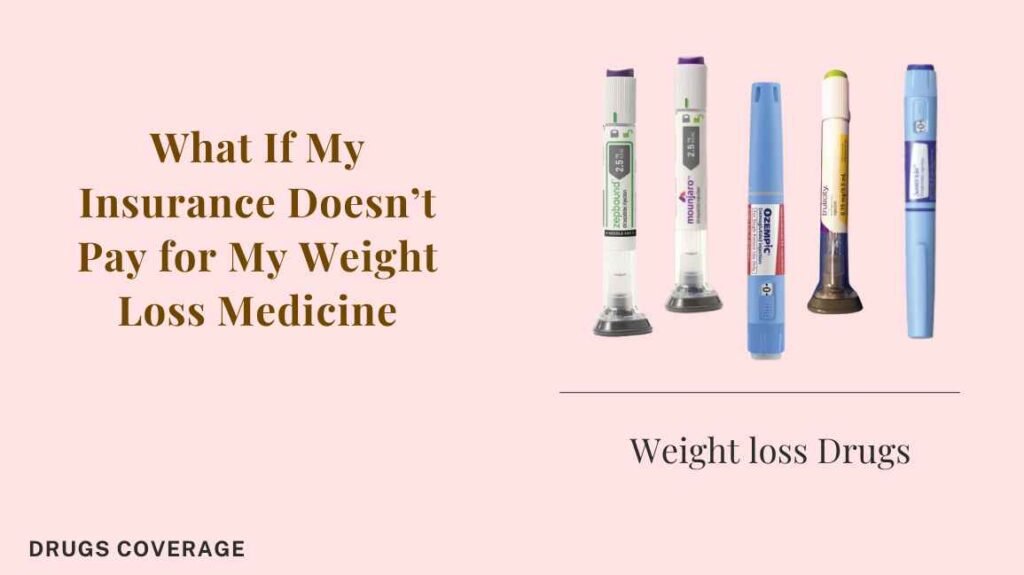
Understanding health insurance can be really tough, especially when you’re looking for certain benefits like coverage for weight loss drugs.
Federal employees and health-conscious people who enrolled in the Blue Cross Blue Shield (BCBS) Federal plan might be curious if this plan covers weight loss medicine.
In todays article, we’re going to talk about the BCBS Federal plan and look into if it covers weight loss medications. We’ll also discuss other health benefits the plan might have that can help people with their weight loss goals.
BCBS Federal Plan Coverage
The BCBS Federal Employees Program is a popular insurance option for federal employees, retired people, and their families. This plan offers coverage for medical, prescription drug, vision and dental expenses.
Recent updates to the BCBS Federal plan have brought significant changes regarding weight loss drug coverage. The plan now includes coverage for GLP-1 (glucagon-like peptide-1) receptor agonists, which are a class of drugs approved by the FDA for weight loss. These medications work by suppressing appetite and slowing down digestion, resulting in reduced calorie intake.
These include Wegovy, Qsymia, Saxenda, Zepbound and Contrave. Additionally, Ozempic and Mounjaro, primarily approved for type 2 diabetes management, are also being prescribed off-label for weight loss. With the rise in obesity rates and related health conditions, these medications have become increasingly popular and effective for weight loss.
In early 2023, the Office of Personnel Management (OPM) issued a letter to Federal Employees Health Benefits (FEHB) carriers, requiring them to cover at least one type of GLP-1 weight loss medication.
This rule means that companies have to make sure people with long-term health problems, like obesity, can get the right and safe medicines easily. It doesn’t list which weight loss medicines must be included, but it aims to make these drugs more accessible and affordable for federal workers with the BCBS Federal plan.
You will need to research which FEHB plan offers your medicine at the lowest price and also think about other things that matter, like how much you pay for the plan, the total yearly costs, and if you can see your doctors easily.
Eligibility Criteria of BCBS Federal coverage for weight loss medications
To be eligible for weight loss medication coverage under the BCBS Federal Plan, applicants must meet specific criteria. These rules make sure that only those who really need the help get it, and that they use it right. Here’s what you need to qualify:
- Age: You must be 17 years of age or older for most drugs.
- Body Mass Index (BMI): There are two important criteria about BMI: – BMI ≥ 30 kg/m2: This usually means obesity and might be enough to get coverage by itself.
- BMI ≥ 27 kg/m2 with a weight-related health problem: If your BMI is between 27 and 30, you probably need a weight-related health issue to get coverage. Examples include type 2 diabetes, cardiovascular disease, hypertension, or obstructive sleep apnea.
- Prior Attempts at Weight Loss: BCBS Federal might ask for proof that you’ve tried to change your lifestyle for at least 6 months before they consider paying for medicine. This can be dieting, exercising, or a weight-loss program with a doctor’s help.
- Type of Medicine: The medicine needs a doctor’s prescription and must be on the BCBS Federal list of drugs they pay for.
- Prior Authorization: You’ll likely need approval from BCBS Federal before your doc can prescribe that medication. Usually, this means your doctor has to send over some details about your condition and why you need this specific medication.
Meeting these criteria does not guarantee coverage but serves as a guideline for who may qualify. BCBS Federal members who believe they meet these criteria should contact their plan representative for more information on how to apply for weight loss medication coverage.
Read also: Does Blue Cross Blue Shield Cover Zepbound?
How Can I Check My Own Benefits?
To check your own benefits under the BCBS Federal Plan for weight loss medication coverage, follow these steps:
- Review Your Plan’s Benefit Booklet: Start by looking at the most current benefit booklet for your BCBS Federal Plan. This document provides detailed information on what types of medications and treatments are covered.
- Visit the BCBS Federal Website: The official website often has updates on covered medications and any changes to the coverage criteria. They may also have tools to help you check your coverage specifics.
- Contact BCBS Federal Customer Service: If the information online is unclear or if you have specific questions contact customer service directly for help. Make sure to have your plan ID and details handy for quicker assistance.
- Consult With Your Doctor: Your provider can also help identify if the prescribed weight loss medication is covered under your plan.
- Explore Alternative Coverage Options: If your plan does not cover the medication you need, ask about alternative drugs or supplementary insurance plans that might offer the coverage you’re looking for.
- Understand Your Out-of-Pocket Costs: Even with coverage, you’ll likely have some out-of-pocket expenses. Check your plan’s details for copayments, deductibles, and coinsurance fees related to prescription medications.
People also ask: Does BCBS Ozempic for Weight Loss?
Ensuring Your Weight Loss Drugs Are Covered
To ensure coverage for weight loss drugs under the BCBS Federal Plan, it’s important to closely follow the eligibility criteria and procedures that we discuss earlier.
Properly submits your all necessary documentation for prior authorization like medical records and proof of previous weight loss attempts as it can significantly speed up the approval process.
Please bring also any previous documents you have, like medical notes, personal records, or receipts from past attempts to lose weight through exercise, diet, or medical assistance, so they can be reviewed and copied into your file.
Make sure to first consult with your healthcare provider to select a medication that aligns with both your health needs and your plan’s formulary to avoid unnecessary delays or denials.
Additionally, staying informed about any changes in coverage can help you manage your healthcare more effectively and predict potential out-of-pocket costs more accurately.
What If My Insurance Doesn’t Pay for My Weight Loss Medicine?

If your insurance doesn’t cover the weight loss medication you need, don’t lose hope. There are several steps you can take to find a solution:
Start by appealing the insurance company’s decision. Most plans have an appeals process that allows you to submit additional information or clarification on why the medication is necessary for your health.
Many pharmaceutical manufacturers offer discounts or coupons for their medications. Visit the manufacturer’s website or contact them directly for any assistance programs. For example, for Zepbound and Mounjaro, you can contact Eli Lilly and Company Answers Center at 1-800-Lilly-Rx (1-800-545-5979) for financial assistance information and application forms.
If your current insurance plan consistently fails to meet your healthcare needs, then it might be time to consider alternative options during the next enrollment period.
If you have an Health Savings Account (HSA) or Flexible Spending Account (FSA), you may be able to use these funds to pay for your medication out-of-pocket.
Remember, it’s important to have open and honest discussions with your provider about your situation. They may be able to suggest you any alternatives or adjust your treatment plan to better align with your insurance coverage and financial situation.
A quick overview of weight loss medications
The FDA has approved several prescription drugs to help people who are over weight or obese lose weight and maintain healthy weight levels. These drugs work in various ways to help with weight loss, like suppressing appetite, blocking fat absorption, or increasing metabolism.
Some common weight loss medications covered under the BCBS Federal Plan include:
- Orlistat (Xenical): A medication that blocks the absorption of dietary fat in the body.
- Liraglutide (Saxenda): This injectable medication is a glucagon-like peptide-1 (GLP-1) receptor agonist that helps regulate blood sugar and appetite.
- Semaglutide (Wegovy): Similar to liraglutide, semaglutide is a GLP-1 receptor agonist. It’s also injected and helps regulate blood sugar and appetite.
- Naltrexone/bupropion (Contrave): This medication mixes two drugs: naltrexone, which helps reduce cravings, and bupropion, an antidepressant that can also help with weight loss.
- Phentermine/topiramate (Qsymia): This medication combines phentermine, a stimulant that suppresses appetite, and topiramate, an anticonvulsant medication that may also help with weight loss.
- Orlistat (Xenical, Alli): This medication works by blocking the absorption of some dietary fat. Xenical is a prescription medication, while Alli is a lower-dose over-the-counter version.
- Setmelanotide (Imcivree): This medication is specifically for people with a rare genetic condition called leptin receptor deficiency, which can cause obesity.
- Tirzepatide (Zepbound): This is a new GLP-1 receptor agonist medication that was recently approved by the FDA for chronic weight management.
Keep in mind that these medications aren’t a quick fix for losing weight. They’re effective only when combined with a healthy diet and consistent exercise routine.
Conclusion
In conclusion, getting insurance to cover weight loss medication with the BCBS Federal Plan can be complex, but if you know the right steps and where to look for help, you can definitely get the support you need for your health.
Be sure to talk openly with your provider and insurance company, explore all available options, and stay informed about any changes in coverage. Remember that weight loss medications are just one part of a bigger plan for managing weight and getting healthier. With determination and a good plan, you can reach your goals without spending too much.
FAQ
Can I get coverage for weight loss drugs prescribed off-label?
Coverage for off-label prescriptions, including weight loss drugs, varies significantly by insurance plan. The BCBS Federal Plan usually requires medications to be FDA-approved for the condition being treated to provide coverage. For off-label use, you might need to get special permission first. You’ll also have to show proof that this medicine is needed and works well for your health problem.
Does Fed BCBS cover Ozempic?
Coverage for medications like Ozempic under the Federal BCBS (Blue Cross Blue Shield) plan depends on the specific details of your policy and the reason the medication is prescribed. Ozempic is not technically a weight loss medication, but it can be prescribed off-label for obesity treatment.
Does BCBS cover weight loss injections?
Coverage for weight loss injections under the Blue Cross Blue Shield (BCBS) Federal Plan can also vary significantly, much like coverage for medication. While many BCBS plans may cover FDA-approved weight loss injections like Semaglutide (Wegovy) and Liraglutide (Saxenda) when prescribed for obesity treatment, it is essential to review your specific policy details. It’s also best to seek pre-authorization from your insurance company before starting treatment.